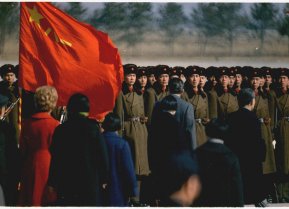A Russian-Chinese Partnership Against America?
China and Russia consider themselves great powers, and there is agreement in both Beijing and Moscow on cooperating to limit or constrain America’s ability to dominate international relations and challenge their sovereignty.
Competing with Russia and China requires a careful evaluation of U.S. obligations around the world. Not all Russian or Chinese actions—in Africa or Latin America, or with the Belt and Road Initiative, for example—are harmful to U.S. interests. The argument that Washington needs to conduct a more restrained foreign policy in place of liberal interventionism should be accorded the serious attention it deserves.
The United States should cooperate with both countries where feasible, but any wedge strategy like that pursued during the Richard Nixon era is unlikely to succeed. Instead, Washington needs a more nuanced and subtle strategy of engaging bilaterally where possible, pursuing more effective diplomacy, cultivating allies, and prioritizing arenas of competition. The United States should push back against malign behavior, whether in the form of violating territorial sovereignty, cyberaggression, flouting international norms, or unfair trade practices. It may take some effort to find common ground, but there are serious global threats that demand collective action—dealing with pandemics, addressing climate change, securing reductions in nuclear arms, and combatting terrorism. We should also seek cooperative trade agreements with both Russia and China and avoid confrontational posturing that merely heightens tensions to no good end. Skilled diplomacy can reduce the risk of military conflict, yet the State Department lacks the resources it needs for effective bargaining. Finally, scientific and educational exchanges with Russia and China should be preserved and expanded.
Russia and China are convinced the United States is in decline. Admittedly America’s domestic politics are dysfunctional, its political culture deeply divided, and its economic system highly inegalitarian. The Trump administration’s America First policy undermined U.S. standing internationally by neglecting diplomacy and unnecessarily antagonizing allies and partners. The United States has more and better allies than either China or Russia, and this source of strength should be cultivated in both Europe and the Indo-Pacific. Washington also needs to restore American soft power damaged by a year of racial unrest, inept governance, partisan bickering, and domestic extremism. Russia and China are highly skilled at traditional diplomacy and disinformation but are fairly weak on most dimensions of genuine soft power. The United States may not be able to change Russian or Chinese behavior or undermine their strategic partnership, but restoring some degree of consensus and effective governance in Washington—in short, real leadership—will better position the country to deal with the Sino-Russian challenge.
Charles E. Ziegler is Professor of Political Science and University Scholar at the University of Louisville, and faculty director for the Grawemeyer Award for Ideas Improving World Order. He is the author or editor of five books and over 120 articles on various aspects of Russian and Eurasian politics and foreign policy. He has also served as the Executive Director of the Louisville Committee on Foreign Relations since 1990.

